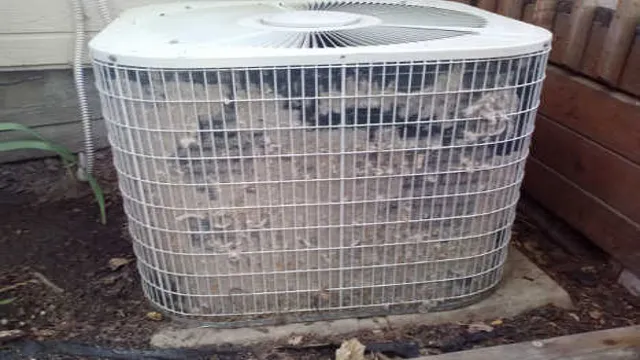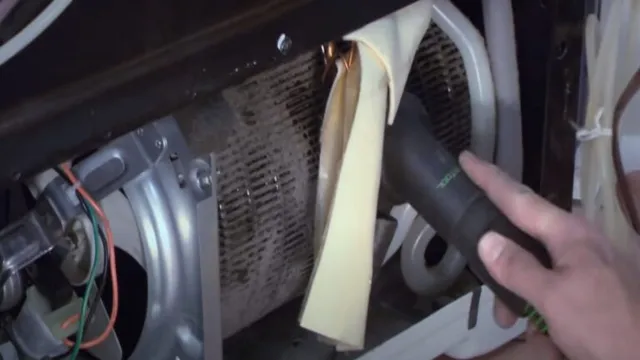Have you ever experienced your air conditioning system suddenly freezing up? It’s not just an inconvenience; it’s a sign that something’s wrong. The most likely culprit? A dirty condenser. When dirt, leaves, or other debris accumulates on your AC’s condenser coils, it can restrict airflow and cause the system to overwork.
Eventually, this can lead to the evaporator coils freezing up and resulting in no cool air. Think of your AC like a car engine. If the air filter is clogged, the engine can’t breathe, and it won’t run properly.
The same goes for your AC’s condenser coils. If they’re dirty, the system can’t draw in enough air to function, causing it to work harder and leading to a possible freeze-up. So, what can you do to prevent a dirty condenser? Regular maintenance is key.
Make sure to clean the area around the outdoor unit and hose down the coils at least once a year. Additionally, consider scheduling routine maintenance with a professional technician. They can inspect your entire system, clean the coils, and keep your AC running efficiently.
By taking care of your AC’s condenser, you can avoid an unexpected freeze-up and the discomfort of a hot, humid home. So, don’t neglect this vital piece of equipment. Keep it clean and well-maintained, and enjoy a cool, comfortable living space all summer long.
What is a condenser?
Yes, a dirty condenser can indeed cause a freeze up. But first, let’s clarify what a condenser is. In an air conditioning unit, a condenser is responsible for releasing the hot air that was removed from the indoor space.
It works by compressing the refrigerant gas, which turns it into a high-pressure, high-temperature vapor. As the vapor flows through the condenser coils, the hot air is released into the outside environment, and the refrigerant is cooled and turned back into a liquid. However, if the condenser coils become dirty and covered in debris such as dirt, leaves, and grass clippings, the airflow is restricted, and the heat exchange process can’t occur properly.
This can cause the refrigerant to become too cold, leading to a freeze up of the unit. So, it’s important to keep the condenser clean and free of any debris to prevent this from happening.
Explaining condensers and their role in an HVAC unit.
A condenser is an essential component of an HVAC (heating, ventilation, and air conditioning) system that plays a crucial role in maintaining a comfortable indoor environment. It works by converting hot gas into a liquid state, releasing heat in the process. The condenser unit is installed outside the home or building and houses the compressor, condenser coil, fan, and control center.
When the warm indoor air flows over the evaporator coil, the heat is absorbed, and the refrigerant becomes a gas. This gas is then compressed, which raises its temperature and pressure, and sends it to the condenser coil outside. As the hot gas moves through the condenser coil, it releases heat and condenses into a liquid, which is then sent back inside to repeat the cycle.
A well-maintained condenser will ensure proper cooling, energy efficiency and extend the lifespan of an HVAC unit.

What causes freeze up?
Yes, a dirty condenser can cause freeze up in your air conditioning system. The condenser is responsible for releasing the heat that is absorbed by the refrigerant in the evaporator coil. When the condenser becomes dirty or clogged with debris, it limits the airflow and can cause the refrigerant to become too cold.
As a result, the moisture that is usually removed from the air by the evaporator coil can freeze on the coils and cause a blockage. This can lead to a reduction in the cooling capacity of your AC system and can cause it to work harder, consuming more energy and potentially causing damage to the compressor. Regular maintenance, including keeping the condenser clean, can help prevent freeze ups and keep your AC operating efficiently.
Explaining the reasons why an HVAC unit might freeze up.
If you’ve ever experienced your HVAC unit suddenly freezing up, the cause of it can be traced back to a few different reasons. One common issue is a lack of airflow. When there is not enough airflow, the system’s evaporator coil can become too cold, which leads to ice buildup and eventually causes the unit to freeze.
Another potential cause could be low refrigerant levels, which is necessary for the system to work properly. A dirty air filter can also be a culprit in a freeze. When filters are clogged, they restrict airflow, which can cause the coil to become too cold and freeze.
Lastly, a malfunctioning thermostat or control board can be to blame for a freeze. Ensuring proper maintenance and inspections can prevent these issues and keep your HVAC unit running efficiently.
Can a dirty condenser cause freeze up?
Yes, a dirty condenser can indeed cause a freeze up in your HVAC system. The condenser plays a crucial role in the refrigeration cycle, releasing heat from your home and cooling the refrigerant back into a liquid state. When the condenser becomes clogged with dirt, dust, and debris, it cannot function efficiently.
This means it cannot transfer heat as well as it should, resulting in the refrigerant not being cooled enough. As a result, the refrigerant may not fully evaporate and will return to the compressor as a liquid, causing it to overheat and potentially freeze up. Therefore, it’s vital to keep your condenser clean to ensure your HVAC system runs smoothly.
You can hire professionals, or you can clean it yourself by using a soft brush and gently cleaning the fins, removing debris from surrounding the area, and clearing out any grass or plant growth around the unit.
Examining how dirt and debris on a condenser can lead to a freeze up.
A dirty condenser can definitely cause a freeze up, both literally and figuratively. To understand why, it’s important to first understand what a condenser does. In an air conditioning system, the condenser is responsible for releasing the heat that’s been absorbed from your home’s air.
This is done through a series of coils that contain refrigerant. When the air is blown over the coils, the refrigerant absorbs the heat and carries it outside to be dispersed. Now, if the condenser coils are dirty, they can’t release the heat as efficiently.
Dirt, dust, and debris can build up on the coils and create a barrier that prevents the air from reaching the refrigerant. Without airflow, the refrigerant can’t release the heat and instead, becomes colder and colder. Eventually, this can cause the refrigerant to freeze, which will prevent the air conditioner from working effectively or at all.
To visualize this, think of the condenser coils as a radiator. If there’s a layer of mud or dirt covering the radiator, it won’t be able to release the heat from your engine effectively. As a result, your engine will overheat and eventually seize up.
The same concept applies to your air conditioning system. If the condenser coils are covered in dirt, the refrigerant won’t be able to release the heat from your home’s air, and the system will eventually freeze up. In conclusion, a dirty condenser can cause a freeze up in your air conditioning system.
It’s important to have your system cleaned and serviced regularly to prevent this from happening. By keeping your condenser coils clean and free of debris, you can ensure that your air conditioner is working at optimal efficiency and that you’ll stay cool and comfortable all summer long.
How to prevent freeze ups from a dirty condenser?
Yes, a dirty condenser can cause a freeze up in your HVAC system. To prevent this from happening, it’s important to perform regular maintenance on your system, including cleaning the condenser coils. You can do this by first turning off power to the unit and then using a soft brush to gently remove any debris or dust on the coils.
Next, use a hose to rinse away any remaining dirt or grime. It’s also important to keep the area around the condenser free of obstructions, such as plants or debris, to ensure proper airflow. Additionally, make sure to change your air filter regularly to prevent dirt and dust from accumulating on the coils.
By taking these steps to keep your condenser clean, you can prevent freeze ups and ensure that your HVAC system runs smoothly and efficiently.
Tips on how to maintain and keep your condenser clean to avoid freeze ups.
A dirty condenser can lead to discomfort inside your home, as it can result in freeze ups. By keeping your condenser clean, you can minimize the need for repairs and save money in the long run. One way to maintain your condenser is by regularly checking it for dirt, debris, and other obstructions.
If you notice any buildup, use a soft brush to gently remove it. Another way to keep your condenser in good condition is by replacing the air filter. A dirty filter can cause the unit to work harder and may lead to freeze ups.
Changing your filter every three months is recommended, but it may need to be done more frequently if you have pets or if there is a lot of dust and pollen in your area. Overall, taking a few simple steps to maintain your condenser can help prevent freeze ups and ensure that your home stays comfortable all year round.
Conclusion
In conclusion, the answer is simple: Yes, a dirty condenser can cause freeze up! Just like how neglecting to clean your room can lead to a messy and chaotic living space, ignoring the maintenance of your air conditioning unit can result in an icy build-up that will leave you feeling chilled to the bone. So, keep your condenser clean and your temperature regulated for a comfortable and stress-free summer!”
Recap of the relationship between dirty condensers and freeze ups.
Dirty condensers can cause freeze ups in air conditioning units. This happens when the condenser coils, responsible for releasing heat absorbed from the inside of the building, get covered in dirt, debris, and grime. When the coils are dirty, they cannot release heat efficiently, and the refrigerant temperature drops below freezing point, causing ice to form on the coils.
This ice buildup affects the unit’s ability to cool the building, and could also cause serious damage to the compressor, which could potentially need replacing. To prevent freeze ups from a dirty condenser, the coils must be cleaned regularly. Coils can be cleaned by washing them down with a hose or using specialized coil cleaning products.
Regularly checking air filters and replacing them when dirty can also help reduce the amount of dirt and debris that accumulates on the condenser coils. By keeping the condenser coils clean, air conditioning units can run more efficiently, consume less energy, and have a longer service life.
FAQs
How can a dirty condenser cause a freeze up?
When the condenser is dirty, it can restrict the airflow and cause the system to work harder to cool the air. This extra workload can cause the system to freeze up.
What are some signs that a dirty condenser may be causing a freeze up?
Some signs include poor airflow, a lack of cool air, ice buildup on the coils, or strange noises coming from the system.
How often should I clean my condenser to prevent a freeze up?
It is recommended that you clean your condenser at least once a year to prevent any potential issues with freezing up.
Can a dirty condenser cause other problems besides freeze ups?
Yes, a dirty condenser can also cause the system to work less efficiently, resulting in higher energy bills and potentially damaging the compressor over time.

